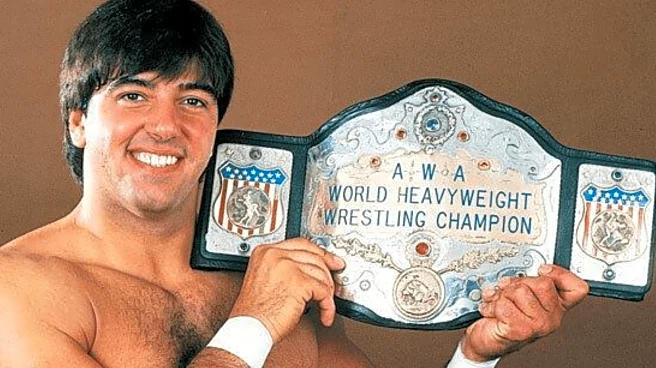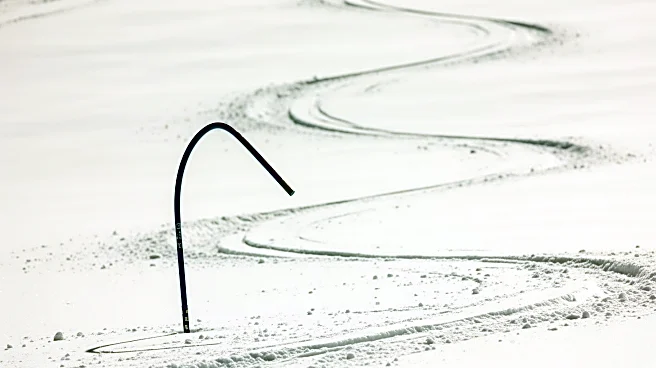In pro wrestling, to be branded a quitter is a tough tag to shake. For a babyface, that label makes gaining fan support especially difficult.
Such was the case for Rick Martel after losing the AWA World
Championship to Stan Hansen. It wasn’t the loss that stung so much. Rather, it was how the French Canadian hero lost that hurt his credibility.
On Christmas Day in St. Paul, Minnesota, 1985, Martel defeated Hansen by disqualification when Hansen repeatedly slammed Martel’s back into the ring post. Even after the referee stopped the match, Hansen’s brutal attack continued as he slammed Martel onto the concrete floor before whipping him with a bullrope and cowbell.
Four days later, in East Rutherford, New Jersey, Martel faced Hansen with an injured back. Near the end, Martel was trapped in a Boston Crab. He fought hard to escape, but Hansen illegally used the turnbuckle pad to maintain the hold. Unable to break free, Martel — the babyface, the good guy, the never-say-die hero — did the unthinkable.
He quit.
Cheers erupted as the referee raised the villain’s hand, marking the end of Martel’s almost 600-day reign as champion. Perhaps sensing a shift in the crowd, Hansen attempted to do some damage control during his post-match promo, albeit with a backhanded compliment that protected his heel persona.
“I give Rick Martel credit,” said the Texas outlaw. “He gave me an opportunity, though I did have to chase him.”
After Hansen left the ring, ring announcer Gary Michael Cappetta continued the damage control, telling the crowd, “Well, ladies and gentlemen, there is no doubt Rick Martel has been one heck of a great AWA World Heavyweight Champion.”
Bad Press
When the story reached pro wrestling magazines in early 1986, the press — usually loyal to kayfabe, treating scripted events as real sport — cast Martel’s defeat in a harsh, unflattering light.
In the April 1986 issue of Sports Review Wrestling, Martel made the front page for all the wrong reasons. The headline read, “‘Quitter!’ The Label That Haunts Rick Martel!” The cover showed Martel clutching his back in the locker room, alongside a larger image of Hansen dominating him in the match.

The article focused on just 23 members of Hansen’s fan club — out of 13,000-plus fans that were reportedly in attendance. As the chant of “Quitter” spread, one fan supposedly shouted, “You chicken$%$*, Canuck, Martel. Tuck your tail and go back to Quebec. Get the hell out of our country, ya yellow-skinned coward.”
It also described a confrontation after the show, where Martel, fed up, allegedly grabbed one tormentor by the arm and threatened to break it. The story continued to throw dirt on Martel, saying he was close to tears when recounting the event.
“I thought that was the last straw. Here I am surrounded by a gang of teenagers. The kid who was talking all the noise had a face full of pimples, for crying out loud,” Martel reportedly stated.
The article ended with Martel getting the last word — defiant and determined.
“As soon as my back heals, I will wrestle again. I defeated Hansen 10, 15 times in my career. I will regain my championship. I will prove to myself and my fans that I am not a quitter. I am not a quitter!“
The Aftermath
Although the article focused on the treatment Martel supposedly received from rogue fans, the overall tone reflected poorly on him. The headline branded him a quitter. He allegedly roughed up fans described as teenagers and was portrayed as being on the verge of tears.
Had a heel turn been imminent for Martel, the piece would have made sense as a bit of foretelling. Instead, Martel eventually left the AWA and returned to Canada before rejoining WWE — where he had competed years earlier — in late 1986.
Tom Zenk, Martel’s former partner in the Can-Am Connection, offered a cynical take on the bad press surrounding Martel’s title loss. In an interview published on TomZenk.net, Zenk — who had a falling out with both Martel and WWE over money in 1987 — claimed that Martel was haunted by being labeled a quitter and had carefully orchestrated the story around his loss.
“He was known everywhere as a ‘quitter,’ and that really troubled him,” said Zenk.
Zenk claimed that Martel struggled to draw crowds as AWA champion, prompting owner and booker Verne Gagne to seek a new star. Martel supposedly got back at Gagne by choosing to drop the title to Hansen. He knew Hansen’s success was mainly in Japan, and that such a move would hurt Gagne’s chances to make money on title defenses in the States.
Zenk added that Martel knew there would be financial opportunities for him challenging Hansen in Japan. He claimed that while booking in Montreal, Martel had done favors for Japanese promoter Giant Baba, who employed Hansen.
“That gave him an ‘in’ with Baba and he was looking for $10,000 a week to wrestle Hansen in AJPW as the former AWA Champion,” Zenk claimed.
He also accused Martel of fabricating a back injury and feeding the story to wrestling’s kayfabe magazines to protect his image as a gutsy competitor. But the plan backfired, according to Zenk, who said fans still saw him as a quitter for submitting. Zenk believed that it led to a career decline for Martel.
Whether Zenk’s claims are true or rooted in lingering resentment over Martel securing better deals for himself — despite the two debuting in WWE as a team — is worth noting.
As for his departure from the AWA, in a 2005 interview, Martel cited his differences with Gagne as his reason for leaving the territory.
“Verne was a hard man to work for because Verne made things hard for nothing,” Martel said. “He was not a pleasant man to do business with, and he had his ideas, didn’t have an open mind about anything.”
As for his later years, Martel went on to have a successful run in WWE. After Zenk’s exit, Martel was paired with Tito Santana. As Strike Force, Martel and Santana captured the WWE Tag Team titles.
A couple of years later, the team split, and Martel was repackaged as “The Model,” a heel who valued his looks and fashion sense above all else. In a twist, Martel adopted the Boston Crab, the very move that cost him the AWA title, as his finishing move.
Although he failed to capture singles gold in WWE, Martel would win the WCW World TV title in 1998 before retiring for good by the end of the decade.
Today, Martel remains one of the most memorable characters of WWE’s ’80s and early ’90s golden era. Despite being labeled a quitter in wrestling magazines, Martel turned the page and crafted what can fittingly be described as a model career.











